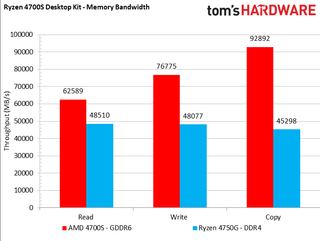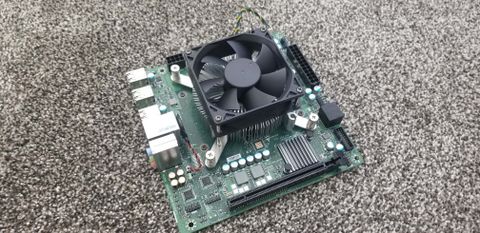Why you can trust Tom's Hardware


| AIDA 64 Latency Measurements | AMD 4700S - GDDR6 | Ryzen 7 4750G - DDR4 |
| Memory Latency | 145ns | 74ns |
The 4700S Desktop Kit is unique because it uses GDDR6 for main memory, just like consoles, but it doesn't have to share the memory throughput with a greedy graphics engine. The general idea with graphics memory (GDDR) is to gain higher bandwidth and lower power by sacrificing latency, and our test results indicate that holds true for the 4700S CPU.
Latency measurements vary based upon the type of access pattern and test depth used, and here we can see that AIDA, which measures to a 64MB depth, measures GDDR6 latency at 145ns. That's roughly twice the Ryzen 7 4750G that measures at 74ns with stock DDR4-3200 memory.
Using a memory latency tool created by Lamchester (from chipsandcheese.com) that measures to a 1GB depth, we recorded peak latencies of 246ns for the 4700S with GDDR6 memory, and 123ns for the Ryzen 7 4750G with stock DDR4-3200.
This higher latency will penalize latency-sensitive applications, like games.

We've already seen the impact of trading higher latency for additional bandwidth, but the eight GDDR6 memory packages that feed the CPU across an aggregate 256-bit pipe do provide a tremendous amount of throughput.
The AMD 4700S with GDDR6 memory achieves 92,892 MB/s of copy bandwidth, which is roughly twice the throughput of the 4750G with DDR4. Gains are more muted with strictly read or write workloads, but the bandwidth is still impressive. This increased throughput will benefit bandwidth-hungry applications and vectorized workloads.
- MORE: Best CPUs for Gaming
- MORE: CPU Benchmark Hierarchy
- MORE: AMD vs Intel
- MORE: All CPUs Content
Current page: AMD 4700S Cache and Memory Latency Benchmarks
Prev Page AMD 4700S Desktop Kit Test Setup, Boost Clocks, Thermals, Power Next Page AMD 4700S Desktop Kit Gaming Benchmarks
Paul Alcorn is the Managing Editor: News and Emerging Tech for Tom's Hardware US. He also writes news and reviews on CPUs, storage, and enterprise hardware.
